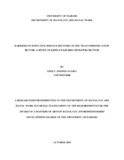| dc.description.abstract | The study investigated the problem of effective service delivery in the telecommunication sector
with specific focus on Safaricom and its subsidiary service of M-Pesa. It examined the
challenges faced by M-Pesa Section employees of Safaricom limited in their endeavor to
effectively deliver services to their clients. It further assessed the effect of professional staff
training at Safaricom, how Safaricom M-Pesa Section employees coped with the challenges that
they faced and the impact of rapid customer growth and employee expectations. Although the
literature review demonstrated that some research on the effectiveness of service delivery in the
telecommunication sector had been undertaken by a number of scholars most of them had
focused more on the customers and therefore there was little evidence to show that research on
barriers to effective service delivery in Safaricom had been given scholarly attention. This hiatus
made the proposed study abundantly significant and justified.
Methodologically, the study employed an elaborate scheme of oral interviews, questionnaires
and library research to collect data. The data collected was subjected to a number of theoretical
perspectives.
The study demonstrated that there were training programs available but the programs were
unable to meet the customer challenges and neither did they improve the skills and abilities of
the M-Pesa customer representatives. The lack of career growth, poor remuneration and job
security followed in that order in terms of their hindrance to effectiveness of service delivery
with many of the M-Pesa representatives claiming they were a major hindrance to service
delivery. The study also argued that rapid customer growth had become a major barrier to
effective service delivery since the M-Pesa representatives were overwhelmed thus
compromising quality of service. Similarly, employee expectations had become a barrier to
effective service delivery due to the fact that most of the expectations the M-Pesa representatives
had regarding their employer had waned thus leading to an I don’t care attitude thus a major
barrier to service delivery.
The study thus concluded that lack of proper training programs, unfriendly job environment,
rapid customer growth and thwarted employee expectations were major barriers to effective
service delivery in the M-Pesa section of Safaricom. The study was useful since it helped gather
insights on barriers to effective service delivery. However further studies should be carried out in
order to gather more information about service delivery in different business setups. | en_US |

